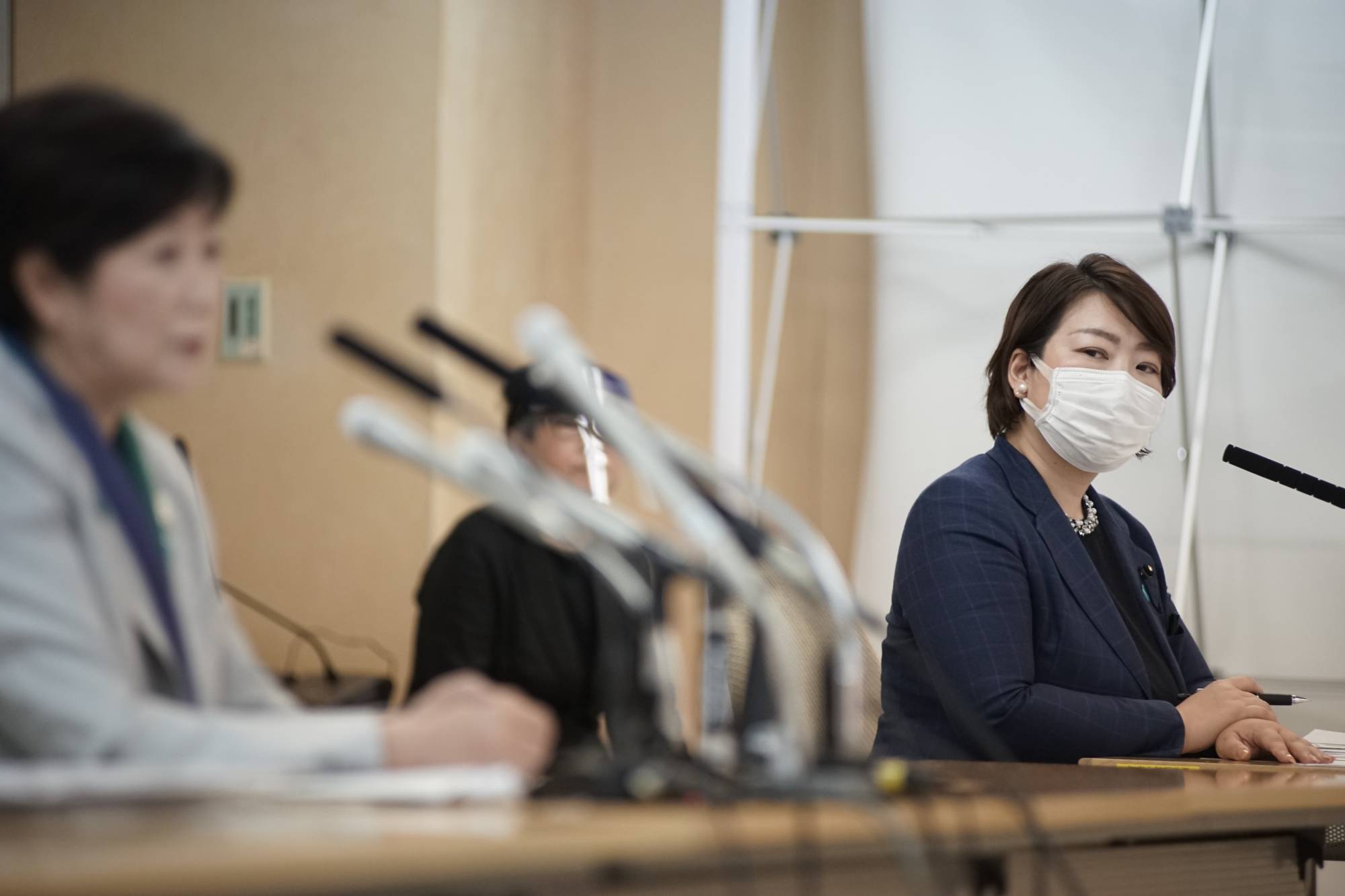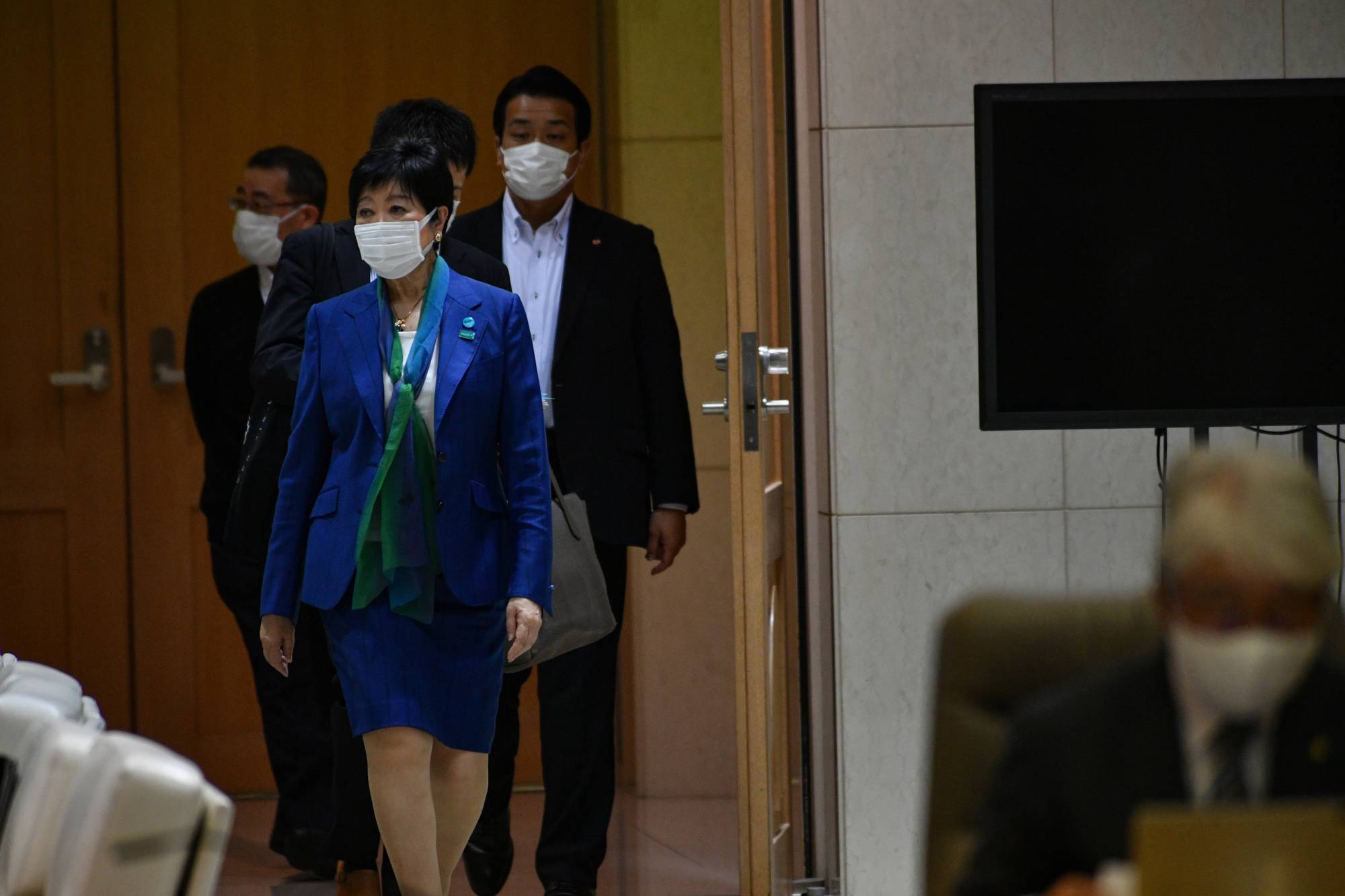Political observers bristled and buzzed earlier this month when Tomin First no Kai — a regional party founded in 2017 by Tokyo Gov. Yuriko Koike — created a national party, First no Kai, to field candidates in the Lower House election on Oct. 31.
For Koike, whose unspoken desire to become prime minister is one of the worst-kept secrets in Japanese politics, the formation of a new party on the eve of a pivotal election had seemed like the perfect path back to the national stage.
But such speculation was stamped out when the governor, who serves as a special adviser to Tomin First, said she played no role in the decision to form First no Kai — and that she has no intention of running in the upcoming election.
And yet, Chiharu Araki, leader of Tomin First and now First no Kai, said in early October that Koike played a significant role in deciding to form a national party, going as far as to say the governor helped decide the name.
Without a strong flag-bearer, however, and little time to recruit candidates or create a winning policy platform from scratch, First no Kai isn’t expected to win many parliamentary seats, if any. This begs the question: Why create a national party and why do it now?
Speculation aside, the fuss surrounding First no Kai dates back to 2017, when Koike formed a national party — Kibo no To (Party of Hope) — days before Prime Minister Shinzo Abe announced a snap election. Of the 235 candidates Kibo no To fielded, 50 won seats — a result far short of expectations due in large part, critics said, because Koike chose not to run herself.
Kibo no To sought and failed to supplant the right-leaning Liberal Democratic Party, but First no Kai — a self-proclaimed “conservative centrist” party — is taking a different approach by aiming to claim the narrow space between Japan’s ruling and opposition parties with a platform that embraces a combination of conservative and progressive agendas.
“We’ve often been frustrated that the voices of Tokyo residents do not reach the national political stage,” Araki said in early October after announcing the launch of the party.
On Monday, First no Kai published on its website a number of policy initiatives, including constitutional reform, less dependence on nuclear power, the pursuit of a carbon neutral society and gender equality. They also vowed to strengthen border restrictions and virus countermeasures to combat the COVID-19 pandemic.
“Constitutional reform makes (First no Kai) more palatable to right-wing voters, and carbon neutral and gender equality makes them more attractive to the center left,” said Kenneth McElwain, a professor in comparative politics at the University of Tokyo’s Institute of Social Science.
But attempting to appeal to a wide range of voters isn’t without risk: First no Kai’s platform could garner support from voters on both sides, or none from either.
“In the end voters do care about what they perceive as policy competence,” McElwain said, adding that, while the new party is “hitting a lot of parties where it hurts,” the plan is likely to fail unless Koike runs for office.



Koike, 69, has achieved near-celebrity status, having spent nearly three decades climbing the political ladder — holding posts such as environment minister and defense minister along the way — to become the household name she is today.
Koike was initially elected governor of Tokyo in 2016 as an independent candidate. In 2020, she was re-elected in a landslide victory — reaffirming her strong grip on the capital — with support from the LDP and Komeito, which together form the ruling coalition in the Diet.
Fumio Kishida, who replaced Yoshihide Suga as prime minister earlier this month, is already struggling to attract public support, with a number of polls showing his approval ratings were hovering close to 50%, which is particularly low for a new prime minister but still higher than Suga’s outgoing figures.
The emergence of First no Kai demonstrates the growing weakness of the LDP, according to Yasushi Aoyama, a professor at the Meiji University Graduate School of Governance Studies who served as vice governor of Tokyo from 1999 to 2003.
“The LDP has been gradually losing the support of small-business owners and farmers for over two decades, so there’s a real thirst for a new party that can answer the needs of disenchanted voters,” Aoyama said. “First no Kai is targeting those people, but it doesn’t have the policies to do it successfully.”
First no Kai’s chances have also taken a hit because of the electoral schedule. Before Kishida announced earlier this month he would dissolve the Lower House and hold the election on Oct. 31, with the official campaign period to kick off Tuesday, the vote was expected to be held later, possibly on Nov. 7.



First no Kai is recruiting candidates via a public call for applications, the deadline for which is Sunday.
The party is looking to field candidates primarily in the capital, where seats could be within reach thanks to a potential boost from incumbent members of the Tokyo Metropolitan Assembly, should they help with the campaign, as well as Koike, if she chooses to campaign for the party later this month.
Her support and physical presence during Tokyo Metropolitan Assembly elections in July earlier this year helped Tomin First prevent the LDP from gaining more seats.
Koike’s sudden, late intervention in the race — after being admitted to a hospital due to severe fatigue — prompted speculation that she might use the victory as a springboard back into national politics. Following the assembly election in the capital, former Prime Minister Naoto Kan tweeted that the upcoming general election was Koike’s last chance to become prime minister. Toshihiro Nikai, then the LDP’s secretary-general, even said he would welcome Koike back into the party.
Time and again, Koike has denied any speculation or suggestion that she’s aiming for the country’s premiership.
However, Aoyama believes the governor had planned to run for office in the upcoming election but backtracked after Kishida moved the timeline forward.
Though Aoyama is doubtful, he said it’s possible Koike has her sights set on the Upper House election slated for next summer.
“If Koike didn’t intend to run for office, (Tomin First) wouldn’t have started a new party,” he said. “That they would run in a national election without Koike’s full support is unthinkable.”
In a time of both misinformation and too much information, quality journalism is more crucial than ever.
By subscribing, you can help us get the story right.
SUBSCRIBE NOW


